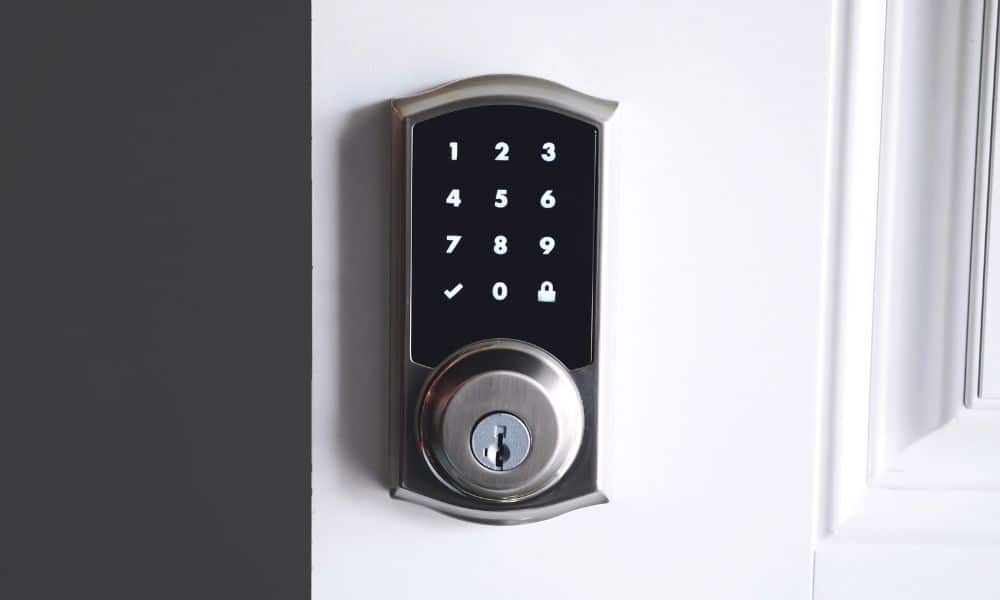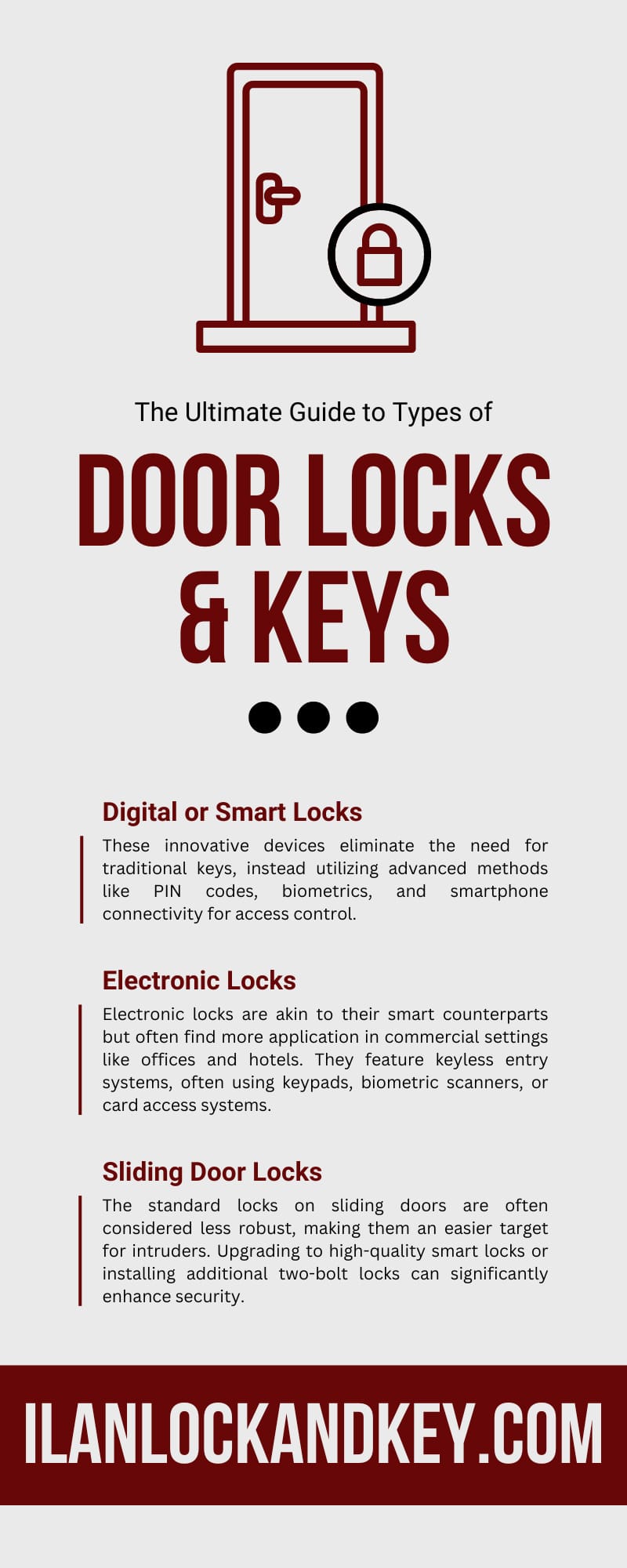
Whether you’re a homeowner, a business owner, or someone interested in enhancing security for another type of structure, understanding the options available for door locks can make a significant difference. Explore this ultimate guide to types of door locks and keys to learn more about each style.
Digital or Smart Locks
In an era where technology reigns supreme, digital locks, or smart locks, have emerged as frontrunners in door security. These innovative devices eliminate the need for traditional keys, instead utilizing advanced methods like PIN codes, biometrics, and smartphone connectivity for access control. A standout feature of smart locks is their ability to integrate with home automation systems, allowing for remote monitoring and control.
This not only enhances security but also adds a layer of convenience, such as being able to lock your door from anywhere using your smartphone. The versatility and advanced features of smart locks make them ideal for modern homes and tech-savvy users seeking both security and ease of use.
Electronic Locks
Electronic locks are akin to their smart counterparts but often find more application in commercial settings like offices and hotels. They feature keyless entry systems, often using keypads, biometric scanners, or card access systems. The flexibility of these locks allows for easy access management, such as changing codes or issuing new cards, which is particularly beneficial in environments with high employee turnover.
Despite their electronic nature, many models come with a conventional key lock as a backup, ensuring access is maintained even during a power failure. Their blend of security, adaptability, and ease of use makes electronic locks popular for businesses and institutions.
Sliding Door Locks
Sliding doors, with their sleek design and space-saving benefits, are popular in many modern homes. However, their unique opening mechanisms necessitate a different lock type. The standard locks on sliding doors are often considered less robust, making them an easier target for intruders. Upgrading to high-quality smart locks or installing additional two-bolt locks can significantly enhance security.
Two-bolt locks work by sliding steel bolts into the door frame, reinforcing the door against forced entry. For those who prefer a blend of style and security, upgrading the locking mechanisms on sliding doors is a wise investment.
Magnetic Locks
Magnetic locks, or maglocks, offer a distinct approach to door security. These locks use an electromagnetic field to secure the door and require an electrical current to remain locked. This makes them a fail-safe option—in a power outage, the door automatically unlocks, allowing for easy egress. While this feature benefits safety, it poses a security risk during power failures.
Therefore, magnetic locks are often used along with traditional locks or as part of a comprehensive security system in commercial settings. Their seamless operation and quick unlocking mechanisms make them suitable for high-traffic areas where emergency exits might be necessary.
Euro Cylinder Locks
As their name suggests, Euro cylinder locks are common in Europe, often used in residential settings for internal or patio doors. Their design allows for easy rekeying or replacing, making them a convenient choice for homeowners. However, they are known to be less robust than other lock types and are particularly vulnerable to certain types of forced entry, such as lock snapping.
While these locks may be suitable for interior doors or situations where high security is not a priority, they are generally not recommended for external doors. For homeowners looking for a balance between convenience and security, euro cylinder locks can be a suitable choice for interior doors.
Single-Cylinder Locks
The single-cylinder lock is perhaps the most widespread type of deadbolt used today. Its mechanism is straightforward: the lock is operated with a key from the outside and a thumb turn on the inside. This setup provides a good balance of security and convenience, allowing easy exit in an emergency without needing a key.
However, this also means that if an intruder breaks a window or panel next to the door, they could reach in and turn the thumb latch to unlock it. Despite this vulnerability, single-cylinder locks remain popular for residential doors due to their simplicity and effectiveness in various settings.
Double-Cylinder Locks
Double-cylinder locks are a variation of the traditional deadbolt, requiring a key for operation from both the inside and outside. This design eliminates the vulnerability of the thumb turn found on single-cylinder locks, offering an added layer of security, especially for doors with nearby windows or glass panels.
However, this increased security comes at the cost of convenience; in emergencies like fires, exit times will slow down due to the need for a key to unlock the door from the inside. For this reason, while double-cylinder locks provide excellent security against break-ins, they should be used with caution and consideration of potential emergencies.
Doorknob Locks
Doorknob locks are a familiar sight in many homes, often used on interior doors. The lock is integrated into the knob itself and is typically operated by a key on the outside and a turn or push button on the inside. While they are convenient and widely used, knob locks offer a relatively low level of security.
They are vulnerable to different types of forced entry, including lock picking and the application of excessive force to the knob. As such, while suitable for providing basic privacy and security within a home, doorknob locks are not recommended as the sole security measure for exterior doors. Instead, they are best used with more secure lock types like deadbolts.
Lever Handle Locks
Lever handle locks are commonly found in commercial settings and are recognized for their ease of use, especially for individuals with limited hand strength or dexterity. The lock mechanism is similar to that of a doorknob lock, with a key-operated lock cylinder on one side and a twist knob on the other.
While they offer accessibility advantages, lever handle locks typically provide a similar level of security to doorknob locks, which is relatively low compared to deadbolts or more sophisticated lock types. For this reason, they are often used in interior applications where convenience and accessibility are more critical than high security.
After reviewing this ultimate guide to types of door keys and locks, remember that the right lock can make all the difference in your security setup. Whether you opt for a high-tech digital lock or a traditional deadbolt, each type offers a unique set of features and varying levels of security. For those in the City of Roses looking to upgrade their home security, consult a residential locksmith in Portland for personalized advice and professional installation services.

